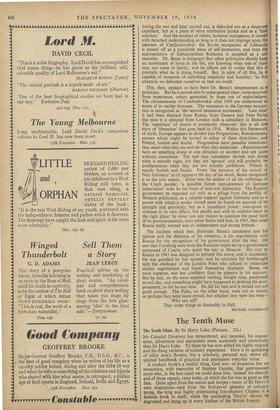The Tenth Muse
The Tenth Muse. By Sir Harry Luke. (Putnam. 25s.) No Colonial Governor has remembered, and recorded, his impres- sions, adventures and encounters more accurately and attractively than Sir Harry Luke. To these he has now added his highly original and far-flung varieties of culinary experience. Here is no gathering of other men's flowers, but a scholarly, personal and, above all, spirited handbook of practical and permanent everyday value. A cookery book's a wistful thing, God wot: of evocation but no revocation, with memories of Stephen Gaselee, that gastronomer royal who, in the best salad we could dress him, 'missed' his chervil; and of those repasts, rarer today, at which the fun was as good as the fare. Quite apart from the menus and recipes—many of Sir Harry's own Inspiration—and from the fool-proof glossary of culinary terms, the long and highly entertaining Introductory Chapter is a bedside book in itself; while the concluding 'Don'ts' should be engrossed and hung up in every kitchen of the British Empire.
It is pleasant to learn that the Fijians call the fiercely hot little red DePPers so popular in Spanish America `godciammits,' no less pleasant (for your reviewer) to be reminded of the Arab host's practice of Picking out 'the juiciest morsels of the mutton off his own plate,' rolling them into gigantic pills with the rice, onion, pine-kernels, cinnamon and garlic and `placing the resultant bolus firmly in our Mouths.' These compliments of about the size, and consistency, of golf-ball, Lawrence schooled himself to enjoy. 1 never could; tor, despite a lifelong affection for the Arabs, more than two or three Arab dishes. Turkish cooking, on the other hand, may surely be placed third in the total list—immediately following the world leadership of France and Austria.
Amongst what Arabs would call the many nawadir, or rareties, comes Accident Sauce, from the Governor of British Guiana—'so (Ailed because originally made by accident'; No. 321 `To improve Indifferent brandy'; Barrosa Cup (of incredible richness and potency) traditional loving-cup of the Royal Irish Fusiliers'—even 'A Good Soft Drink.' Prawn Cream soup is supplied by our Ambas- sador at Santiago, Sir John Leche (a frequent contributor). Lobsters appear in eleven variations, from Brittany, Malta, USA, New Hebrides, Homberg, a French Vice-Admiral and the steward of _HMS Iron Duke; Roast Peacock from a chateau in Touraine and the West Indies; 'the bird is bred for the table in the Dominican Re- Public.'
'A woman who has mastered sauces,' says the Wise Youth in Richard Feverel, 'sits on the apex of civilisation.' She will sit even higher when she has mastered Chapter VI, Sauces, Salad Dressings, Salads and Herbs': the two Sauces Bearnaises (from Flor- ence and Guatemala), Sauce Espagnole—'the base of all brown sauces,' or Trinity Salad, Oxford, said to be derived from Homer. Lastly, an irony of language (lamented by me for nine years), that while the globe artichoke grows to greater perfection, perhaps, In Jerusalem than anywhere else in the world, the Jerusalem artichoke Is quite unknown in the Holy Land.'
Let hotels, restaurants and, generally, palates of discernment bear In mind that Christmas is icumen in, llude sing Cookoo.
RONALD STORKS











































































 Previous page
Previous page